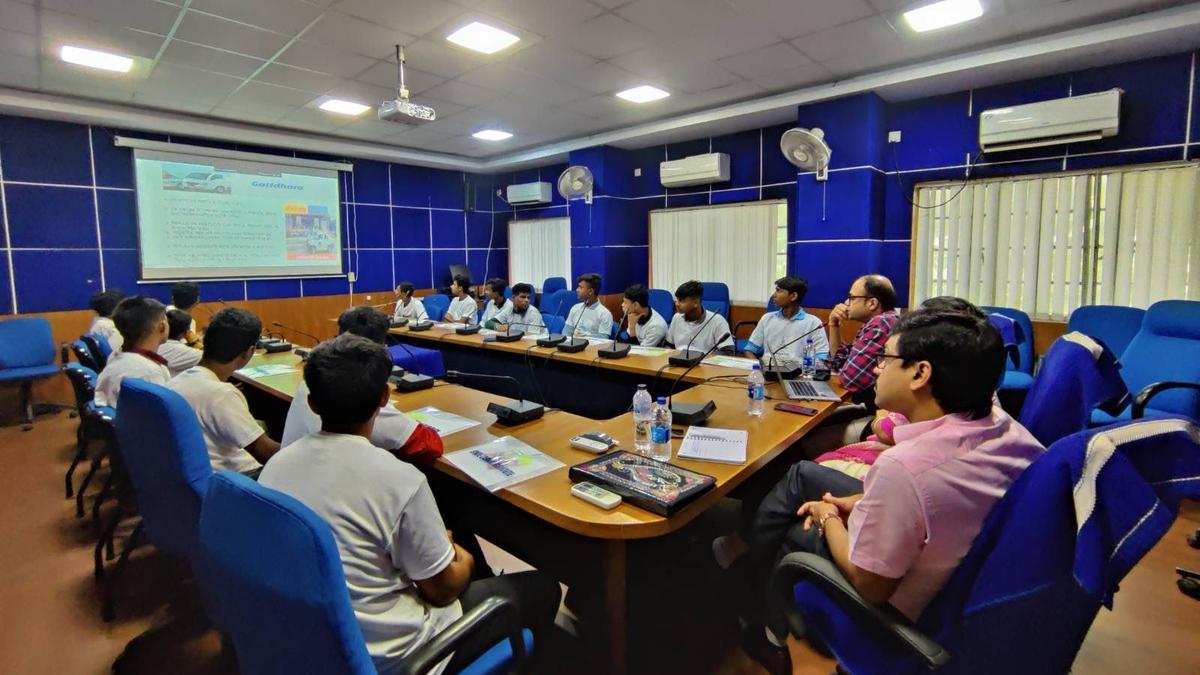
Skill training of youths rescued from Tamil Nadu.
| Photo Credit: Special Arrangement
About 143 young adults from West Bengal working as bonded labourers were rescued from gold manufacturing units in Tamil Nadu between 2019 to 2024. Many of them are scripting their own success stories. Information obtained from the non-government organisation and West Bengal government pointed out that 60 children and young adults were rescued in September 2019, 22 in February 2023, 54 in July 2023, and seven in November 2024.
Dipankar Bera, 20, a survivor rescued from a jewellery unit in Chennai, now works as junior officer, operations at fast food barbeque restaurant chain after undergoing training in a Hooghly-based centre under the National Skill Development Corporation.
Dipankar, who resides in Hooghly recalls the days when he used to be locked inside a jewellery manufacturing unit in Chennai and says his life is so different now. “With government’s support and training, I now have a proper job. I have a designation, a proper salary, leaves and benefits,” he said.
Dipankar’s story is also echoed in the experiences of Al Amin (18) who has returned to school and enrolled in a computer course, nurturing his dream of becoming a cyber security expert. Amin is also a community advocate, raising awareness so other young adults fall into the same trap of bonded labours.
“The work at the jewellery unit was gruelling. We and other boys my age worked long hours, crafting hundreds of pieces of gold jewellery daily. The harsh chemicals and metal dust left our hands stained, scarred, and burned,” the youth from North 24 Parganas said.
Chiranjit Mondal ( 21) is working as housekeeping staff in a food services and facilities management firm and is not shy of admitting that working conditions in Tamil Nadu from where he was rescued and where he is working now is different. “The staff where I work treat me with kindness. I am grateful to everyone who supported me in my journey and the workplace that hired me despite my limitations. I am looking forward to working hard and supporting my family in every way I can,” Chiranjit, who hails from Maipeeth in South 24 Parganas said.
All the three, Chiranjit Dipankar and Amin were rescued by the Tamil Nadu police from gold jewellery manufacturing units in the southern state.
Psychological and Career counselling for those rescued
An official of the West Bengal Labour department said the entire rescue and bringing them and handing them over to parents is a convergence of different departments and non government organisations. The official said that those rescued were provided with psychological and career counselling so that they can overcome the trauma and resume work in more dignified conditions. The State government also provided guidance and training to the youths under ‘Utkarsh Bangla’ scheme.
“West Bengal does not have the problem of bonded labour or child labours. Those rescued are from other states and in case of bonded labourers it is workers from other states who are working here,” the official said.
West Bengal government officials said that the young adults, who are rescued are not forced to go but they join the work of other villagers or their relatives from the same neighbourhood. Despite being abolished under the Bonded Labour System (Abolition) Act 1976, bonded labour continues to persist in hidden, informal sectors, particularly affecting the poorest and most vulnerable communities.
Young adults fall prey to such practices on the pretext of employers providing skills in sectors like gold ornament making.
Published – May 01, 2025 01:16 pm IST
Anurag Dhole is a seasoned journalist and content writer with a passion for delivering timely, accurate, and engaging stories. With over 8 years of experience in digital media, she covers a wide range of topics—from breaking news and politics to business insights and cultural trends. Jane's writing style blends clarity with depth, aiming to inform and inspire readers in a fast-paced media landscape. When she’s not chasing stories, she’s likely reading investigative features or exploring local cafés for her next writing spot.




